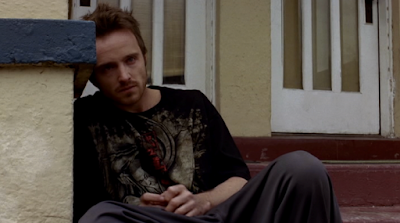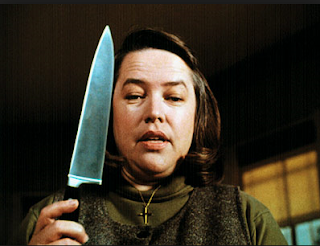Misery
Wednesday, December 9, 2015
Wanna cook some crystal?
In recent years, no TV show can be more addicting than Breaking Bad, a show about a chemistry teacher dying of cancer that becomes a legend crystal meth cook with the help of his former student. One of my favorite shows, and yet if put side by side with Stephen King's Misery, you could really dissect how cocaine, crystal, or any drug could have a huge affect on someone's life. In Breaking Bad, Jesse Pinkman is no doubt a druggie. In the show, he struggles to balance his addiction with his girlfriend, his crystal business, and his relationship with Walter White, his business partner and meth cook. Although his addiction puts him in solitude, he never tries to recover. On the other hand, it's all Paul tried to do in Misery. Even with his broken legs he tried to plan and attempt many ways out and metaphorically, he wanted to be saved from his drug but no one was there to help him. As for Jesse Pinkman, Walter White brought him to a rehab facility where he made tremendous progress. Even though he was clean for a while, once a druggie always a druggie, so it was only a matter of time when he started using again. This is contrary to Misery, where Paul eventually leaves Anne Wilkes' house and never looks back. Together, both Misery and Breaking Bad show how drugs will turn from a simple past time into the last breath you take, ultimately scaring the audience into the reality the faces the lives of many every day of their limited lives.
I'm your number one fan. There's nothing to worry about. You're going to be just fine.
Anne Wilkes – you look at her, and she seems a little crazy,
but at first glance you trust her. She gives you an environment that you’ve
always wanted. For Paul Sheldon, it was having a fan like Anne prevent him from
a fatal death, which meant a lot to him. Being healed in a home is comfortable,
making Anne mirror cocaine or any other drug. It looks suspicious when first
introduced, but you know somehow it’ll help you, so you use. At first, just
like Anne, it’ll feel great. All that anger or regret seems to go away and life
seems better, but just like Anne Wilkes, nothing good lasts very long. She then
tells Paul to continue his book, making sure she gets her way, just like drugs would do. She pushes and pushes and addicts like Paul's character know from the beginning what they are getting into, and they keep trying and trying for a way out, but being an addict leaves you alone to face your drug yourself, exactly what Anne did to him. Her character's personality is socially awkward, and also arguably bipolar-when Paul is doing what she wants she's calm and enthusiastic, but when you get her mad she is beyond pissed. Probably why the reader could love and hate her at the same time...
Monday, December 7, 2015
Addiction
According to drugwarfacts.org, about 27 million Americans
used illicit drugs, and about 0.6%, or 1.5 million Americans have used cocaine.
(More statistics found here at http://www.drugwarfacts.org/cms/Drug_Usage#Cocaine)
Knowing this, Stephen King isn’t alone, but being an addict blinds you from
everything important in your life and just pulls your effort and focus on the
drug your using. Stephen King fell into these statistics because it’s extremely
difficult to recover from a drug such as cocaine which is why the novel Misery
is so intriguing. We as a suspense audience have been through scary clowns and
bloody prom queens, but this...this is real life. The book is all just a huge metaphor:
The author in the story being held against his will in severe pain and regret?
That’s a representation of Stephen King in a point of his life, and the woman
who’s holding him hostage? That’s the drug that kept him from the world. The
Rolling Stone magazine interviewed him Halloween of last year and asked how he
managed his secret with his responsibilities of being a father, and he replied,
“I don’t remember.” This reflects how life changing being an addict is,
affecting the people you love the most. In the interview, he admits that
"Misery is a book about cocaine. Anne Wilkes is cocaine. She is my number one fan."You could read more about the interview here: http://www.rollingstone.com/culture/features/stephen-king-the-rolling-stone-interview-20141031
Who is Stephen King anyway?
Rise of Misery

If you haven’t read the book or seen the movie, basically,
there’s a guy named Paul Sheldon – a suspense writer known for his character
Misery Chaistan in his romantic series. A big time author like him just
finished a novel irrelevant to his series, making him drink again and drive to
LA instead of his usual flight. Unfortunately, things took a turn for the
worst. A snowstorm held him up, making him tumble off a cliff to experience a
horrible car accident. Along comes Anne Wilkes (Kathy Bates in the movie), a
former nurse who happens to be a big fan of his work. She saves him from the
accident and the freezing weather and brings him into her home. Sounds like he’s
got it good, right? Paul thought so too when he woke up, but after having some
discussions with his biggest fan, it turns out you can’t trust Anne Wilkes. She
basically holds him hostage to continue the series that she fell in love with,
the Misery that she adored. While doing so, she tries to bring him back to
health, but with his constant urge to get away, she had to do whatever she
could in her power to keep him there and continue to write her stories, even if
it meant putting him in more pain than he already was.
Introduction to Misery
Stephen King is no doubt my favorite author of all time. He
manages to capture true fear in all his works, mostly based on experiences or
ideas, such as being attacked by a rabid dog led him to write Cujo, or wondering
how many people had the hotel room before him making him create 1408. Misery is
one of his most praised novels and film, making me want to explore the psychology
and reasoning behind the writing of the story and how a disturbingly painful
novel could exist.
Subscribe to:
Comments (Atom)


